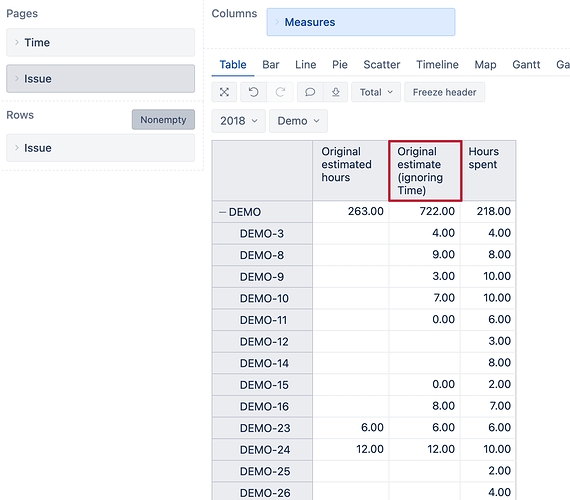Hi,
I would like to analyze the deviations in the estimations of the tasks. For this purpose, I want to get, for all the tickets, the difference between:
- Hours Spent → this is the tracking time logged by the developers on each ticket.
- Original estimate → this is a field in the JIRA ticket. We type a value manually when the ticket is created and never modify it.
On the other hand, we use the “Story Points” field as a remaining work indicator, so this field can be modified during the ticket’s lifecycle, so this field could be to zero at the last sprint where the ticket is closed, so we do not want to take into account the “Story Points” field.
PROBLEM:
- When I create the Analyze table in EazyBI, I try to use the measure called “Original estimated hours”.
- However, it seems that “Original estimated hours” measure in EazyBI is not matching with the current value from the JIRA ticket’s field “Original estimate”.
- What I see is that I have tickets with certain value for the “Original estimate” field (different from zero), but the data shown for “Original estimate hours” in the EazyBI table is empty. It’s rather that EazyBI takes the JIRA ticket’s “Story Points” field insted of the “Original estimate”
- In fact, I cannot find the field “Original estimate” in the import data settings for JIRA at EazyBI.
Could you give me some tip to solve this problem please?
Here you can see the “Original estimate” field for a JIRA ticket as an example:

Hi again…any idea about my question?
I am a bit frustrated…I really need to get this kind of deviations reports…Thanks in advance!
hi @Pedro_Celdran ,
The reason why your measure “Original estimate hours” is empty could be because of your report context or what other dimensions you have in your report.
For example, the measure “Original estimate hours” is linked to the Time dimension by issue creation date. But if you use the Sprint dimension then “Original estimate hours” will be linked only by the current sprint. If you have the “Logged by” dimension in your report then also the report could be empty.
Thus please check what other dimensions you have in your report and how the measure interacts with them.
If you would like to display the “Original estimate” at issue ignoring the Time dimension, then you can create a tuple using [Time].CurrentHierarchy.DefaultMember:
([Measures].[Original estimated hours],
[Time].CurrentHierarchy.DefaultMember)
In the report:
best,
Gerda // support@eazyBI.com
Thanks a lot for your help Gerda 
I have taken the tip you provided and I have used for creating two custom measures that ignore the sprints:
- Original estimate (ignore sprint)
([Measures].[Original estimated hours],
[Sprint].CurrentHierarchy.DefaultMember)
- Hours spent (ignore sprint)
([Measures].[Hours spent],
[Sprint].CurrentHierarchy.DefaultMember)
By using these two measures, i have solver part of my problem, because now I am able to get the full original estimate value and also all the spent hours for each issue. however I cannot filter when the issues passed to “Done” status per each sprint, which is the other side of my original problem.
The information that I’d really wish to get in the report would be as follows:
- to retrieve the “original estimate hours vs spent hours”, by issue, but not all issues…
- the issues should be filtered as described below:
-
- choose a single sprint / several sprints from the “page” filter section, so I can show the info for each sprint
** to include only those tickets that had a transistion status to “Done” within the date when the sprint was open.
SUMMARIZING: we work in Agile, by 2 week development sprints. When a ticket is changed to “DONE” status within the sprint, then it must be included in the report, and for each ticket we need the “spent hours” and “original estimate hours”:
- Spent hours: these hours can come not only from the current sprint, because sometimes one ticket is not “DONE” during only 1 sprint but several consecutive sprints.
- Original estimate hours: this value is set when the ticket is estimated and the value is not modified afterwards, it remains the same value.
Could you give me a hand with this? Again? 
Hi to anyone…any idea about my last question? Thanks in advance…

